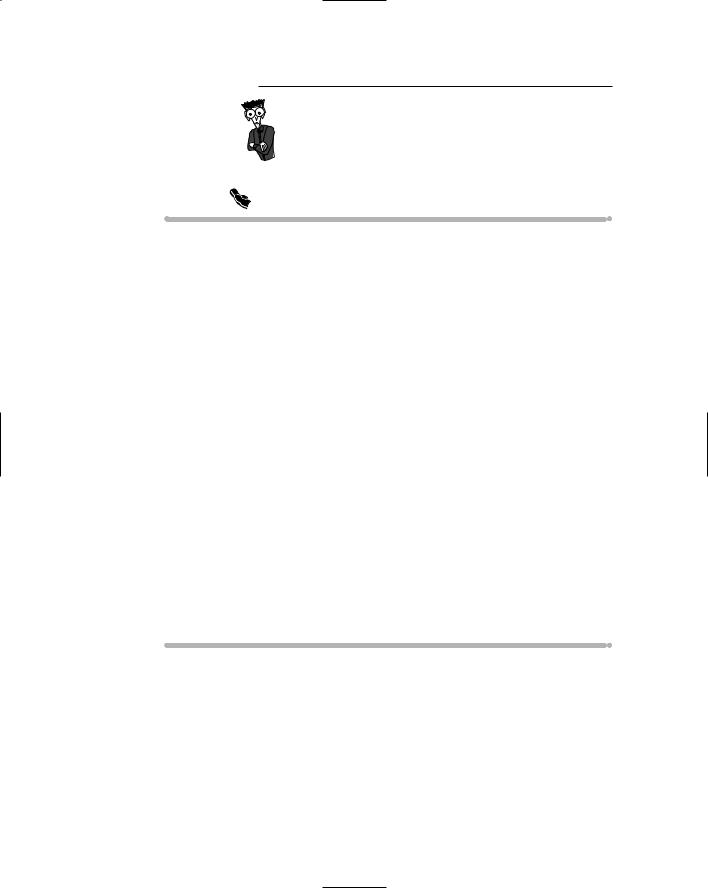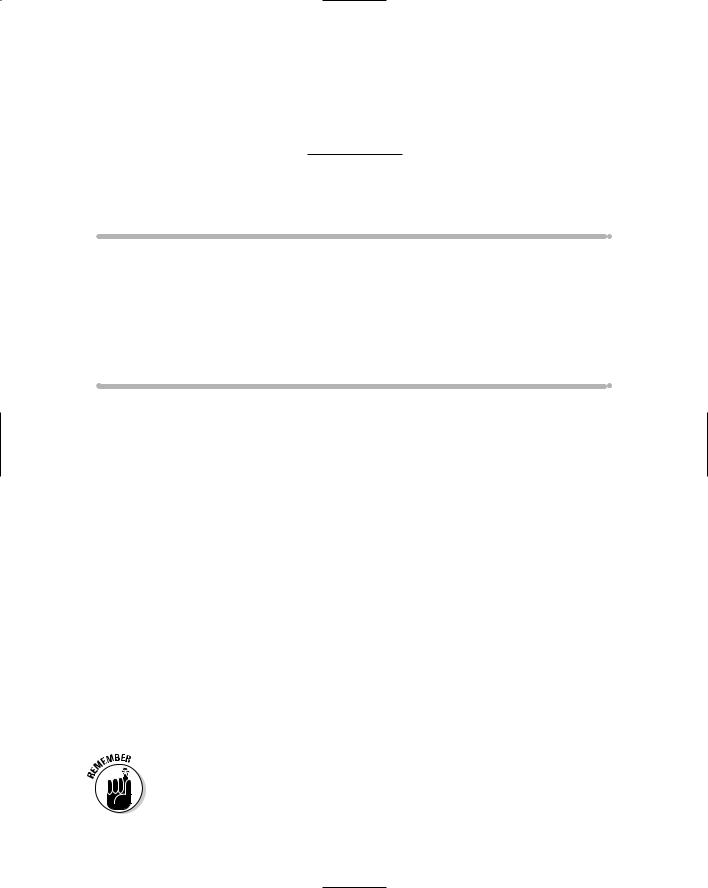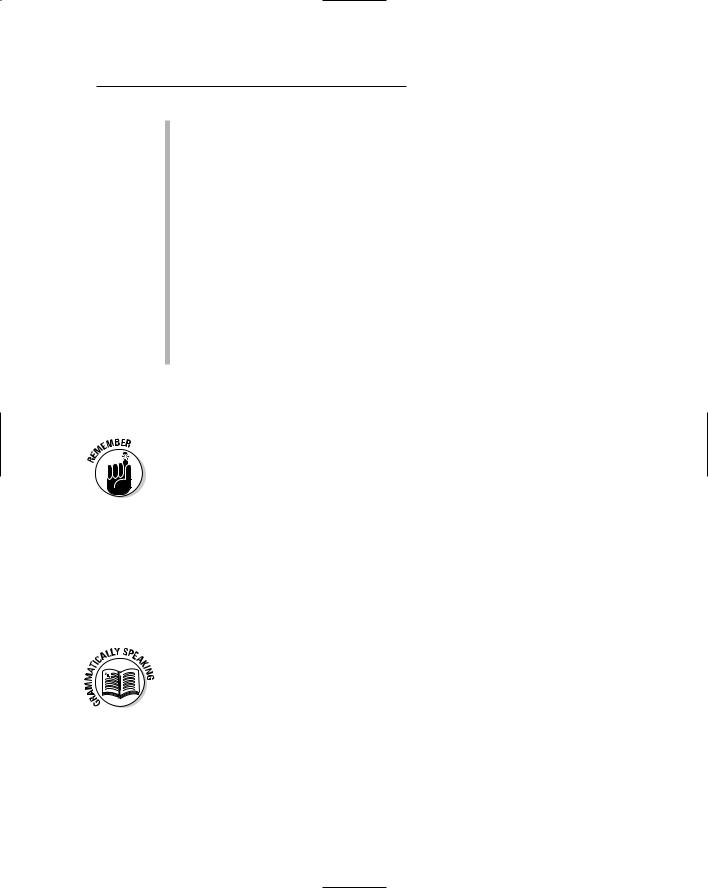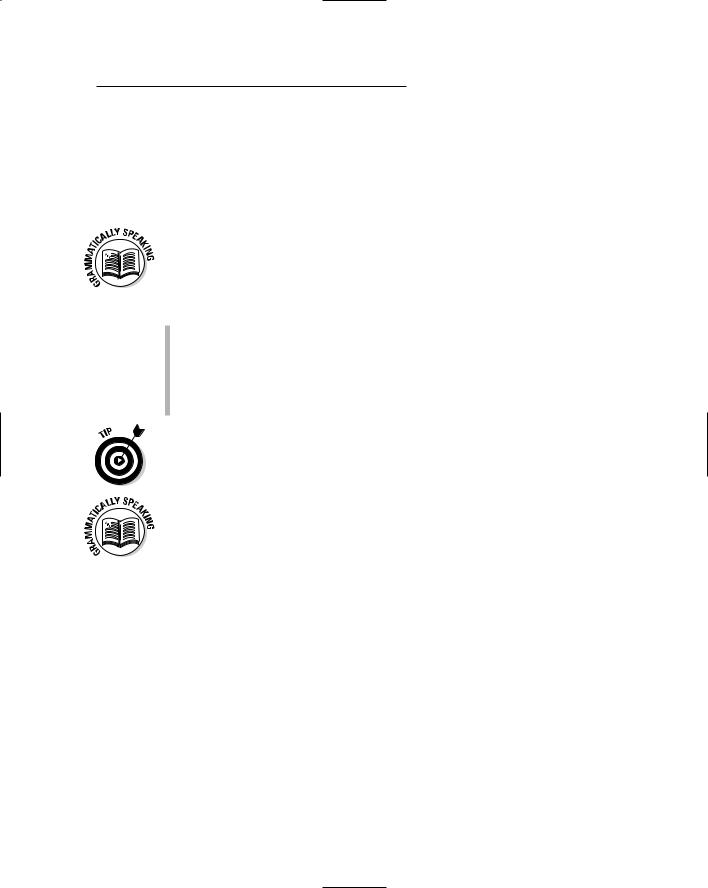
Russian For Dummies
.pdf
114 Part II: Russian in Action
If you feel like asking a waiter what dish he or she recommends or what specialties the restaurant has, be cautioned that your questions may puzzle your Russian server. Only waiters in very nice Moscow restaurants that are trying to emulate their Western counterparts are prepared to answer them. Here is the question you may want to attempt: A chto vy ryekomyenduyetye? (uh shtoh vih ree-kuh-meen-doo-ee-tee; What would you recommend?)
If you suddenly recall something you meant to include in your order or decide that you want something else, try getting the attention of your waiter (who is rushing by you) with a phrase like Izvinitye, vy nye mogli by prinyesti vodu?
(eez-vee-nee-tee vih nee mahg-lee bih pree-nees-tee voh-doo; Excuse me, could you bring water?)
Other common problems you may come across can be resolved just by stating some facts about the meal that alert the waiter and make him take some counter-measures. For example, you may say:
Eto blyudo ochyen’ kholodnoye. (eh-tuh blyu-duh oh-cheen’ khah-lohd- nuh-ye; This dish is very cold.)
Eto blyudo ochyen’ solyonoye. (eh-tuh blyu-duh oh-cheen’ sah-lyo-nuh- ye; This dish is too salty.)
Eto blyudo ochyen’ ostroye. (eh-tuh blyu-duh oh-cheen’ ohs-truh-ye; This dish is too spicy.)
If, on the other hand, you enjoyed your meal and service, be sure to say Vsyo bylo ochyen’ vkusno! (vsyo bih-luh oh-cheen’ fkoos-nuh; Everything was very tasty!) and/or Spasibo za otlichnyj syervis! (spuh-see-buh zah aht-leech-nihy syer-vees; Thank you for the excellent service!)
Receiving and paying the bill
When it comes time to ask for the bill, don’t expect the waiter to bring it automatically. When the waiter is in the vicinity, try to attract his attention either by waving or smiling to him or just saying (loudly, if necessary; Russians are very direct!) Rasschitajtye nas pozhalujsta! (ruh-shee-tahy-tee nahs pah- zhahl-stuh; Check please!)
Asking for several separate checks isn’t common in Russia. Waiters hate doing it even in Russian restaurants abroad. So ask for a check and then prepare to divide the amount by the number of eaters. If you’re buying a meal for somebody or everybody at the table, announce it to the company or person you’re inviting by saying: Ya zaplachu (ya zuh-pluh-choo; I will pay) or Ya plachu
(ya pluh-choo; I am paying) or Ya ugosh’yayu (ya-oo-gah-sh’a-yu; Literally: My treat).

Chapter 5: Making a Fuss about Food 115
As in most restaurants in the world, checks aren’t accepted in Russia. Before paying with a credit card, we recommend that you ask: Vy prinimayetye kryeditnyye kartochki? (vih pree-nee-mah-ee-tee kree-deet-nih-ee kahr-tuhch- kee; Do you take credit cards?)
If the waiter returns before you ask him for the bill, he may tell you how much you owe by saying S vas . . . (s vahs; you owe, Literally: from you is due . . .) If your meal costs 200 rubles 41 kopecks, the waiter will say S vas dvyesti rublyej sorok odna kopyejka. (s vahs dvyes-tee-roob-lyey soh-ruhk ahd-nah kah-pyey- kuh; You owe two hundred rubles and forty-one kopeks.) See Chapter 14 for more details about money.
Talkin’ the Talk
Jack and his Russian fiancée, Natasha, are in a nice restaurant in downtown Moscow. They have just been seated at the table and are now ordering the meal.
Ofitsiant: |
Gotovy? Chto vy budyetye zakazyvat’? |
(waiter) |
gah-toh-vih? shtoh vih boo-dee-tee zuh-kah-zih- |
|
vuht’? |
|
Ready? What will you be ordering? |
Jack: |
Na zakusku, ya budu kholodnyj yazyk s goroshkom i |
|
butyerbrod s ikroj. I shashlyk. |
|
Nuh zuh-koos-koo, ya boo-doo khah-lohd-nihy ee- |
|
zihk s gah-rohsh-kuhm ee boo-tehr-broht s eek-rohy. |
|
ee shuhsh-lihk. |
|
For the appetizer I will have tongue with peas and |
|
caviar sandwich. And roasted mutton. |
Ofitsiant: |
Chto vy budyetye pit’? |
|
shtoh vih boo-dee-tee peet’? |
|
What will you have to drink? |
Jack: |
Kakoye u vas yest’ khoroshyeye vino? |
|
kuh-koh-ee oo vahs yest’ khah-roh-sheh-ee vee-noh? |
|
What good wine do you have? |
Ofitsiant: |
Yest’ risling, yest’ khoroshyeye armyanskoye vino. |
|
yest’ rees-leenk, yest’ khah-roh-sheh-ee uhr-myan- |
|
skuh-ee vee-noh. |
|
We have Riesling, we have a nice Armenian wine. |

116 Part II: Russian in Action
Jack: |
Khorosho, prinyesitye butylku armyanskogo vina. |
|
khuh-rah-shoh, pree-nee-see-tee boo-tihl-koo uhr- |
|
myan-skuh-vuh vee-nah. |
|
Okay. Bring a bottle of Armenian wine. |
Ofitsiant: |
Yesh’o chto-nibud’ budyetye pit’? |
|
ee-sh’yo shtoh-nee-bood’ boo-dee-tye peet’? |
|
What else are you going to drink? |
Jack: |
I butylku minyeral’noj vody. Vsyo. Natasha, chto ty |
|
budyesh’? |
|
ee boo-tihl-koo mee-nee-rahl’ -nuhy vah-dih. fsyo. |
|
nah-tah-shuh, shtoh tih boo-deesh’? |
|
And a bottle of mineral water. That’s it. Natasha, |
|
what will you have? |
Natasha: |
Ya budu syevryugu i kotlyetu po-kiyevski. |
|
ya boo-doo seev-ryu-goo ee kaht-lye-too puh kee- |
|
eef-skee. |
|
I’ll have sturgeon and chicken a la Kiev. |
Ofitsiant: |
Vsyo? |
|
fsyo? |
|
That’s it? |
Natasha: |
Vsyo. |
|
fsyo. |
|
That’s it. |
Ofitsiant: |
Vy khotitye chto-nibud’ na dyesyert? |
|
vih khah-tee-tee shtoh-nee-bood’ nuh dee-syert? |
|
Do you want anything for dessert? |
Natasha: |
Nyet, spasibo. Tol’ko kofye. |
|
nyet, spa-see-buh. tohl’-kuh koh-fee. |
|
No, thank you. Only coffee. |
|
|

Chapter 5: Making a Fuss about Food 117
Words to Know
Gotovy? |
gah-toh-vih |
Are you ready |
|
|
(to order)? |
na zakusku |
nuh zah-koos-koo |
as an appetizer |
Chto vy budyetye |
shtoh vih boo-dee-tee |
What will you |
pit’? |
peet’ |
drink? |
Kakoye u vas yest’ |
kuh-koh-ee oo vahs |
What good wine |
khoroshyeye vino? |
yest’ khah-roh-sheh- |
do you have? |
|
ee vee-noh |
|
Yest’ risling. |
yest’ rees-link |
We have Riesling. |
Chto tih budyesh’? |
shtoh tih boo-deesh’ |
What will you |
|
|
have? |
Vy khotitye chto- |
vih khah-tee-tee |
Do you want any- |
nibud’ na dyesyert? |
shtoh-nee-bood’ |
thing for dessert? |
|
nuh dee-syert |
|
tol’ko |
tohl’-kuh |
only |

118 Part II: Russian in Action
 Fun & Games
Fun & Games
Which of the following two dishes would you most likely eat for breakfast in
Russia? See Appendix C for the correct answers.
1.a. yaichnitsa b. ukha
2.a. zharkoye b. butyerbrod s kolbasoj
3.a. butyerbrod s syrom b. kotlyeta
4.a. kotlyetu s kartofyelyem b. kasha
5.a. varyen’ye b. kapustnyj salat
Which of the following phrases would you probably use or hear while making a restaurant reservation? See Appendix C for the correct answers.
1.Ya khotyel by zakazat’ stolik na subbotu.
2.Mnye, pozhalujsta, butylku moloka.
3.Na dvoikh.
4.Skol’ko chyelovyek?
5.Na vosyem’ chasov.
6.Ya khochu yest’.
7.Ya budu kotlyetu s kartofyelyem.
8.Ya khotyela by zakazat’ stolik na syegodnya.
9.Na kakoye vryemya?
10.Yest’ risling.

Chapter 6
Shopping Made Easy
In This Chapter
Finding out where and how to shop
Looking for clothes
Selecting the items you want
Paying the bill
Checking out great Russian souvenirs to buy
Shopping is a big part of Russian life. During the Soviet era, when getting even basic things like toothpaste was a major challenge, Russians felt
deprived and developed a strong appreciation for any nice things they could buy. As a result, Russians love to hunt for nice, mostly Western-made, goods. Buying anything new, whether it’s a stereo, a sofa, or a coat, is a pleasant experience and an important event. So as an American (or other Westerner) shopping in Russian stores, you should feel right at home!
In this chapter, we tell you about different kinds of stores, and show you how to call for store hours and get assistance when you’re there. We also instruct you in the art of clothes-shopping, Russian-style. We show you how to get the right color and size, how to ask to try things on, and what to say when you want to compare different items. You also find out how to pay for your things in a Russian store. Plus we give you suggestions about some cool souvenirs to get while you’re shopping. Now, let’s go shopping!
Shop ’Til You Drop: Where and How to Buy Things the Russian Way
Stores where you can buy anything (other than food) can be divided into two categories: univyermagi (oo-nee-veer-mah-gee; department stores), most of which are located in the downtown of large cities, and smaller specialized magaziny (muh-guh-zee-nih; stores), which may specialize in anything from tableware to TVs.

120 Part II: Russian in Action
In the following section, you find out about many different kinds of stores and what’s sold in them. You also discover how to inquire about store hours, how to find the specific store or department you’re looking for, and how to ask for assistance when you’re there.
Looking at different types of stores and departments
More and more, fancy specialty stores are popping up throughout Russia and Russian neighborhoods in the U.S. Many of these stores have unique names, but many (especially in Russia) are still simply called by the name of the item they sell. This naming convention is a throwback to the Soviet era, when no concept of marketing products existed. A shoe store, for instance, may simply be called obuv’ (oh-boof’; Literally: footwear), a toy store igrushki (eeg-roosh-kee; Literally: toys), and a book store knigi (knee-gee; Literally: books). The names of stores also may denote the name of an otdyel (aht-dyel; department) within an univyermag (oo-nee-veer-mahk; department store), where a specific item is sold.
Here’s a list of some other stores and departments:
antikvarnyj magazin (uhn-tee-kvahr-nihy muh-guh-zeen; antique store)
aptyeka (uhp-tye-kuh; pharmacy)
byel’yo (beel’-yo; intimate apparel)
dyetskaya odyezhda (dyet-skuh-ye ah-dyezh-duh; children’s apparel)
elyektrotovary (eh-lyek-truh-tah-vah-rih; electrical goods)
fototovary (foh-tuh-tah-vah-rih; photography store)
galantyeryeya (guh-luhn-tee-rye-ye; haberdashery)
gazyehnyj kiosk (guh-zyet-nihy kee-ohsk; newsstand)
golovnyye ubory (guh-lahv-nih-ee oo-boh-rih; hats)
kantsyelyarskiye tovary (kuhn-tsih-lyar-skee-ee tah-vah-rih; stationery products)
khozyajstvyennyj magazin (khah-zyay-stvee-nihy muh-guh-zeen; household goods, hardware store)
komissionnyj magazin (kuh-mee-see-ohn-nihy muh-guh-zeen; secondhand store)
kosmyetika (kahs-mye-tee-kuh; makeup)
muzhskaya odyezhda (moosh-skah-ye ah-dyezh-duh; men’s apparel)

Chapter 6: Shopping Made Easy 121
muzykal’nyye instrumyenty (moo-zih-kahl’-nih-ee een-stroo-myen-tih; music store)
odyezhda (ah-dyezh-duh; clothing store)
parfumyeriya (puhr-fyu-mye-ree-ye; perfume)
posuda (pah-soo-duh; tableware)
sportivnyye tovary (spahr-teev-nih-ee tah-vah-rih; sports store)
suvyeniry (soo-vee-nee-rih; souvenirs)
tkani (tkah-nee; fabric)
tsvyety (tsvee-tih; flowers)
vyerkhnyaya odyezhda (vyerkh-nye-ye ah-dyezh-duh; outerwear store)
yuvyelirnyye tovary (yu-vee-leer-nih-ee tah-vah-rih; jewelry store)
zhyenskaya odyezhda (zhehn-skuh-ye ah-dyezh-duh; women’s apparel)
Calling for store hours
The easiest way to find out whether a Russian store is open is to go there and look for a sign hanging in the door or window with one of these two words on it: Otkryto (aht-krih-tuh; Open) or Zakryto (zuh-krit-tuh; Closed). The next best way is just to call. If nobody answers, it probably means they’re closed. Problem solved! But in case someone does answer, you may want to ask Magazin otkryt? (muh-guh-zeen aht-kriht; Is the store open?) or Do kakogo chasa otkryt magazin? (duh kuh-koh-vuh chah-suh aht-kriht muh-guh-zeen; ’Til what time is the store open?)
If you want to inquire whether the store is open on a particular day, you say, for example, V voskryesyen’ye magazin otrkryt? (v vuhs-kree-syen’-ee muh- guh-zeen aht-kriht; Is the store open on Sunday?) For more on talking about days of the week, see Chapter 7.
In Russian, the simplest way to say that a store (or window, door, or anything) is open or closed is by using a form of the word otkryt (aht-kriht; open) or zakryt (zuh-kriht; closed). If the noun you’re referring to is masculine, just use this form. If it’s feminine, add -a to each of these words, as in Dvyer’ otkryta. (dvyer’ aht-krih-tuh; The door is open.) If the noun is neuter, you add -o, as in Okno zakryto. (ahk-noh zuh-krih-tuh; The window is closed.) And if the noun is plural, you add -y, as in Vsye magaziny otkryty syegodnya. (fsye muh-guh-zee- nih aht-krih-tih see-vohd-nye; The stores are all open today.) (See Chapter 2 for more about the gender of nouns.)

122 Part II: Russian in Action
Some other ways to ask about store hours include the following:
Kogda magazin zakryvayetsya? (kahg-dah muh-guh-zeen zuh-krih-vah- eet-sye; When does the store close?)
Kogda zavtra otkryvayetsya magazin? (kahg-dah zahf-truh uht-krih-vah- eet-sye muh-guh-zeen; When does the store open tomorrow?)
Otrkyvatsya (uht-krih-vaht’-sye; to open) and zakryvatsya (zuh-krih-vaht’-sye; to close) are called reflexive verbs. They don’t take direct objects, because their action refers back to the subject of the sentence. So in the question Kogda magazin zakryvayetsya? (kahg-dah muh-guh-zeen zuh-krih-vah-eet- sye; When does the store close?), you’re literally asking “What time does the store close itself?” That’s because your emphasis is on the fact of the store’s closing, and not on who’s doing it. The infinitive of reflexive verbs usually end in -sya, and you need to add -sya to all the usual conjugation endings except after the ya (ya; I) and vy (vih; you; formal and plural) forms, in which case you add -s’.
The verb zakryvayetsya was formed by adding the reflexive ending -sya to the third person singular form, zakryvayet (zuh-krih-vah-eet; he/she/it closes), of the imperfective verb zakryvat’ (zuh-krih-vaht; to close). (To
refresh your memory about verb infinitives and conjugations, see Chapter 2.)
To indicate working hours in a store, Russians often use a form of the verb rabotat’ (ruh-boh-tuht’; to work). When inquiring about store hours, you’re likely to hear something like Da, magazin rabotayet syegodnya do syemi.
(dah muh-guh-zeen ruh-boh-tuh-eet see-vohd-nye duh see-mee; Yes, the store is open today until 7, Literally: The store works today until 7.) or Magazin nye rabotayet v voskryesyen’ye. (muh-guh-zeen nee ruh-boh-tuh-eet v vuhs-kree- syen’-ee; The store isn’t open on Sunday, Literally: The store doesn’t work on Sunday.)
When you call a store or many places of business in Russia, don’t expect the person on the line to introduce herself and tell you the name of the place you’ve called. Instead, what you most likely hear is an abrupt Allyo! (uh’-lyo; Hello!), Slushayu! (sloo-shuh-yu; Literally: I’m listening!), or simply Da! (dah; Yes!) spoken in a low, serious, or even melancholy voice. Also, try to listen very carefully to the information provided, because once the person on the other end has answered your questions, chances are she will hang up right away! See Chapter 9 for more details about speaking on the phone.
Navigating a department store
If you’re in a big department store searching for that perfect souvenir, you may want to approach the spravochnya (sprah-vuhch-nuh-ye; information desk), or anybody who looks like he works there, and ask the question Gdye

Chapter 6: Shopping Made Easy 123
otdyel suvyenirov? (gdye aht-dyel soo-vee-nee-ruhf; Where is the souvenir department?) or Gdye suvyeniry? (gdye soo-vee-nee-rih; Where are souvenirs?) You may also want to inquire about what floor the souvenir department is on. Just ask Na kakom etazhye otdyel suvyernirov? (nuh kuh-kohm eh-tuh-zheh aht-dyel soo-vee-nee-ruhf; What floor is the souvenir department on?) or simply Na kakom etazhye suvyeniry? (nuh kuh-kohm eh-tuh-zheh soo-vee-nee-rih; What floor are souvenirs on?)
Note that when you say otdyel suvyenirov, you’re literally saying “the department of souvenirs” and you put the word for “souvenirs” in the genitive case. (For more info on case endings for nouns, see Chapter 2.)
After you ask for directions, be prepared to hear something like
na pyervom etazhye (nuh pyer-vuhm eh-tuh-zheh; on the first floor)
na vtorom etazhye (nuh ftah-rohm eh-tuh-zheh; on the second floor)
na tryetyem etazhye (nuh tryet’-eem eh-tuh-zheh; on the third floor)
na etom etazhye napravo/nalyevo (nuh eh-tuhm eh-tuh-zheh nuh-prah- vuh/nuh-lye-vah; on this floor to the right/left)
If you hear something not listed here, don’t panic! Just watch the person’s arm movements. Russians often like to accompany their direction-giving with big pointing gestures.
The ordinal numerals pyervyj (pyer-vihy; first), vtoroj (ftah-rohy; second), and tryetij (trye’-teey; third) act just like adjectives, which means they must agree in number, gender, and case with the nouns they modify. (For details on adjective-noun agreement, see Chapter 2.) Russian uses the prepositional case after the preposition na when indicating what floor something is on. To form the prepositional case of the ordinal numeral pyervyj, you treat the
numeral as if it were an adjective and replace the masculine adjectival ending -yj with -om, as we describe in Chapter 2. And that’s how you get the phrase na pyervom etazhye (nuh pyer-vuhm eh-tuh-zheh; on the first floor).
Asking for (or declining) assistance
When you want to ask for help in a Russian store, your first challenge is to get somebody’s attention. The best way to do this is to turn to any salesperson and say Izvinitye pozhalujsta! (eez-vee-nee-tee pah-zhahl-stuh; Excuse me, please!) If you want a slightly softer approach, you can use the phrase Bud’tye dobry . . . (bood’-tee dahb-ryh; Would you be so kind as to help me, Literally: Would you be so kind . . .)
After you say one of these two phrases, you’ll probably hear Da, pozhalujsta? (dah pah-zhahl-stuh; Yes, how can I help?) After that you can politely ask a
